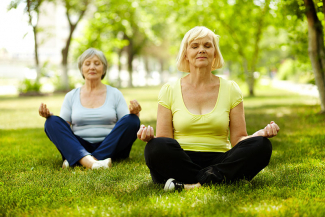
Mindfulness is defined as a mental state achieved by focusing one's awareness on the present moment, while calmly acknowledging and accepting one's feelings, thoughts, and bodily sensations. The state of mindfulness can be an extremely helpful resource for coping with our current shelter-at-home during COVID-19 by calming the mind and body. It is taking time to check-in and do a non-judgmental evaluation of yourself to see how you are doing and feeling – to take a pause out of your day and take time for yourself.
Meditation, which is often closely associated with mindfulness, is a mental exercise that trains attention and awareness. It has been identified as a useful tool to help slow down the progression of Alzheimer’s disease. People who practice meditation have been found to have less atrophy of the hippocampus, the part of the brain that helps with memory and learning. It may help decrease feelings of isolation and loneliness, which can increase the risk of developing Alzheimer’s disease. Meditation can also help reduce the stress hormone cortisol, which can aid in making people feel less stressed and calmer.
Mindfulness and meditation can also be extremely beneficial to people who care for those with Alzheimer’s disease. Being a caregiver for a loved one can bring many positives, be very rewarding, and bring much joy and happiness. A caregiver plays an important role in providing daily encouragement, compassion and support for someone. However, being a caregiver can also add stress and fatigue to one’s daily life. An important part of being a caregiver is to make sure to maintain the health and well-being of yourself and your loved one. Keeping both the caregiver and loved one healthy physically and mentally is important. Practicing mindfulness is a helpful way to manage and cope with the stress of daily caregiving and avoid the very real possibility of burnout. Stress and burnout can hamper the quality of the care and compassion that a caretaker needs to provide and have negative effects on physical and mental health. Mindfulness can help with the daily duties of caregiving and in the long run, make a caregiver more effective. Home Care Assistance shares helpful techniques for caregiver mindfulness and preventing caregiver burnout. Making even small mindful changes over a short amount of time can reap many benefits.
There are also numerous general wellness benefits when practicing mindfulness. Some of the recognized science-based benefits of mindfulness are that it is good for our hearts by lowering blood pressure and the risk of heart disease. It may decrease cognitive decline due to aging or Alzheimer’s disease by promoting the growth of new brain cells. Mindfulness also strengthens the immune response and the body’s natural resistance by enhancing our disease-fighting cells. Cell aging has been observed to slow down in connection with mindful practices as well as psychological pain. Mindfulness has many benefits for older adults including better focus, enhanced calmness, less stress, and improved sleep. It can reduce depression and pain, and boost emotional well-being. It can even help adults come to terms with the challenges of aging.
The Center for Healthy Minds located at the University of Wisconsin-Madison is a wonderful source for mindfulness aides and information. The center offers many helpful articles on their website. One that is particularly interesting is, how brain scans link meditation to slower “brain aging.” The center is also currently offering a COVID-19 Toolkit and live practices that are perfect resources during these uncertain times to help maintain physical and mental health wellness.
The following is a beautiful quote from the founder and director of the Center for Healthy Minds:
“I envision a day when mental exercise will be as much a part of our daily lives as physical exercise and personal hygiene.”
Dr. Richard Davidson – Center Founder and Director for the Center for Healthy Minds, University of Wisconsin-Madison
Online Mindfulness and Meditation Resources
- Center for Healthy Minds
- Mindfulness and Meditation for seniors on YouTube
- Mindfulness Exercises for Seniors
- Walking Meditations
- 1-Minute Mindfulness Exercises
- Daily Calm 10 minutes Mindfulness Meditation
- Headspace – they are offering free support during COVID-19
Story by Erin Lacey
- Log in to post comments



